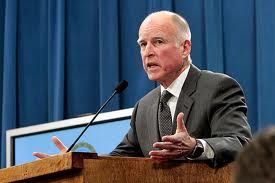Gov. Brown touts California’s ‘rendezvous with destiny’
Jan. 25, 2013
By Katy Grimes
SACRAMENTO — “Have no fear, everything is just fine in California.” At least that’s what people in and around the State Capitol were telling me after listening to Gov. Jerry Brown’s State of the State address yesterday, which I attended in person.
“California has once again confounded our critics,” Brown himself said in the address. “Against those who take pleasure singing of our demise, California did the impossible.”
Promises, promises
Brown promised to follow through with High-Speed Rail, promised to build the 30-mile water tunnels through the Delta, held steadfast on his stance that California continue the lonely pursuit of curbing “climate change” (formerly called global warming), promised to implement Obamacare and said low-income students would be receiving extra funding under his budget this year.
“I salute the unions — their members and their leaders,” Brown said. And he saluted the Legislature for passing some of the most repressive, restrictive legislation in the state’s history.
But after his address, some people said that what Brown left out was disturbing. The governor did not talk about how to improve job growth in the private sector, reduce regulations on business, attract business to the state or even commit to spending the newly passed Proposition 30 tax revenue entirely on education.
He instead gave a little history lesson on the state.
“Remember how California began,” Brown said. “In 1769, under King Charles III, orders were issued to Jose de Galvez, the Visitor General of Baja California, to: ‘Occupy and fortify San Diego and Monterey for God and the King of Spain.´”
The economy of business
While many California business owners report that they are seriously considering moving to other states, some made the move already. The governor’s address did nothing to quell their fears of more tax increases, overwhelming regulatory burdens and increases in government size and spending.
“As legislators, it is your duty and privilege to pass laws,” Brown said. “Constantly expanding the coercive power of government by adding each year so many minute prescriptions to our already detailed and turgid legal system overshadows other aspects of public service.”
But Brown signed 800 more bills into law last year, and 1,000 the previous year. While he does use his veto pen liberally, he still signs some questionable bills into law, and in vast quantities.
Brown again insisted that his 2013-14 budget is balanced. “The budget is balanced but great risks and uncertainties lie ahead,” he said. “The federal government, the courts or changes in the economy all could cost us billions and drive a hole in the budget. The ultimate costs of expanding our health care system under the Affordable Care Act are unknown. Ignoring such known unknowns would be folly, just as it would be to not pay down our wall of debt. That is how we plunged into a decade of deficits.”
Green jobs, and government help
Assemblyman Tim Donnelly, R-Hesperia, said he was glad Brown wants the state to live within its means. “But as the governor of this state, I expected to hear him say something about the 3 million people out of work,” Donnelly said. “Instead, I heard ‘occupy and fortify.'”
Brown talked of the “ignorance and prejudice” in the state’s history. But Donnelly asked, “What about the prejudice against businesses?”
Donnelly shared a recent conversation with a successful Sacramento area business owner, who said in frustration, “I don’t have to be in this state.” Donnelly said the business owner described the government as being “a silent partner” in his business, because of the repressive regulations, taxes, fees and hostile relations with government state agencies.
“California lost 1.3 million jobs in the Great Recession, but we are coming back at a faster pace than the national average,” Brown said. “The new Office of Business and Economic Development — GoBiz — directly assisted more than 5,000 companies this past year.”
GoBiz never met a green job it didn’t like, as the office appears to prefer companies in the renewable-energy arena.
Brown confirmed that he is continuing California’s lonely quest to lead the world in controlling climate change. “According to the latest report from the World Bank, carbon dioxide emissions are the highest in 15 million years,” Brown said.
But one legislator said he can’t believe that Brown is still using such worn out rhetoric on a man-made issue.
“I’ve got 31,000 scientists, including more than 9,000 Ph.D.s in science, who say that the earth’s temperature is not warmer, man is not causing it, and the earth’s temperature hasn’t increased in 16 years,” said Assemblyman Dan Logue, R-Marysville. “Even Time magazine agreed with this. Why are we the only state in the entire country doing this?”
California poverty
Logue said Brown should instead have focused on the high poverty rate in the state. “California has a poverty rate of 23.5 percent, the highest in the nation by far,” said Logue.
California’s rate of 23.5 percent is much higher than the national average of 16.1 percent, according to the U.S. Census Bureau. The next closest state is Florida, with 19.5 percent poverty.
The census report said the high poverty rate was driven in part by California’s high cost of living.
When Brown warned about global warming, he said, “Some of you will be around for that. I won’t.” While he got laughs, the facts don’t measure up.
Brown mentioned Spain during his address, but should look at Spain’s economic crash after buying into green energy and green jobs. Spain ended up paying $775,000 for every green job they created actually lost 2.2 jobs for every green job created. If accounted for, the cost of the lost jobs would increase the real cost dramatically — and the lost tax revenues, and the increased demand for government assistance.
Logue said green policies pushed industry out of Spain, as is happening in California. “Perhaps that’s what’s creating California’s increased poverty,” Logue said.
More promises
Brown is standing firm on the plan to build two massive tunnels through the Delta to carry water to the Southland.
“My proposed plan is two tunnels 30 miles long and 40 feet wide, designed to improve the ecology of the Delta, with almost 100 square miles of habitat restoration,” said Brown. “Yes, that is big but so is the problem.”
“He says he’s getting water to where we need it in the state,” Donnelly said. “But where is water for the farmers? We’re giving water to the fish.”
High-Speed Rail, as expected, was on Brown’s agenda. Especially since he is counting on it to be a substantial part of his legacy. “I signed the original High-Speed Rail Authority in 1982 — over 30 years ago,” Brown said. “The first phase of the project will be built from Madera to Bakersfield before extending through the Tehachapi Mountains to Palmdale. The first rail line through those mountains was built in 1874 and its top speed over the crest is still 24 miles an hour. Then we will build another 33 miles of tunnels and bridges before we get the train to its destination at Union Station in the heart of Los Angeles.”
Brown wrapped up his speech telling the story of “The Little Engine that Could.”
“We all know the story of ‘The Little Engine that Could,’” said Brown, to applause from legislators. “The big engines were asked to haul the freight train over the mountain. They said, ‘can’t do it.’ They asked another, ‘can’t do it.’… The little train said, ‘I think I can.’ And so the engine pulled the long line of freight cars and started puffing away, ‘I think I can, I think I can, I think I can, I think I can. And over the mountain, the little engine went. We’re going to get over that mountain. I have no doubt about it.”
Brown spoke about High-Speed Rail in China and Spain. “Even Morocco is building one,” Brown said, as a reason why we need the train system in California. “It is bold but so is everything else about California.”
“We — right here in California — have such a rendezvous with destiny,” Brown said, referring to a famous line from President Franklin D. Roosevelt. “All around us we see doubt and skepticism about our future and that of America’s. But what we have accomplished together these last two years, indeed, the whole history of California, belies such pessimism.”
The coming months will tell whether the revenues he hopes for come in and fund the schools, High-Speed Rail, the Delta tunnels and his other dreams. Or if California’s tax and regulatory burden has become so high that revenue will disappoint and the deficits will return — with a vengeance.
Related Articles
Fellow Latino Dem puts De Leon on spot over Vergara
The most powerful Latino politician in California is being called out over how he will respond to the Vergara decision,
Michal Bloomberg’s candor beats Jerry Brown’s candor — by a mile
Jack Dean of the invaluable pensiontsunami.com website sent me a Politicker story about departing New York City Mayor Michael Bloomberg’s
Al Gore: Your new neighbor
Despite his environmental hysteria, Al Gore long has had one of the biggest “carbon footprints” of any mammal on the





